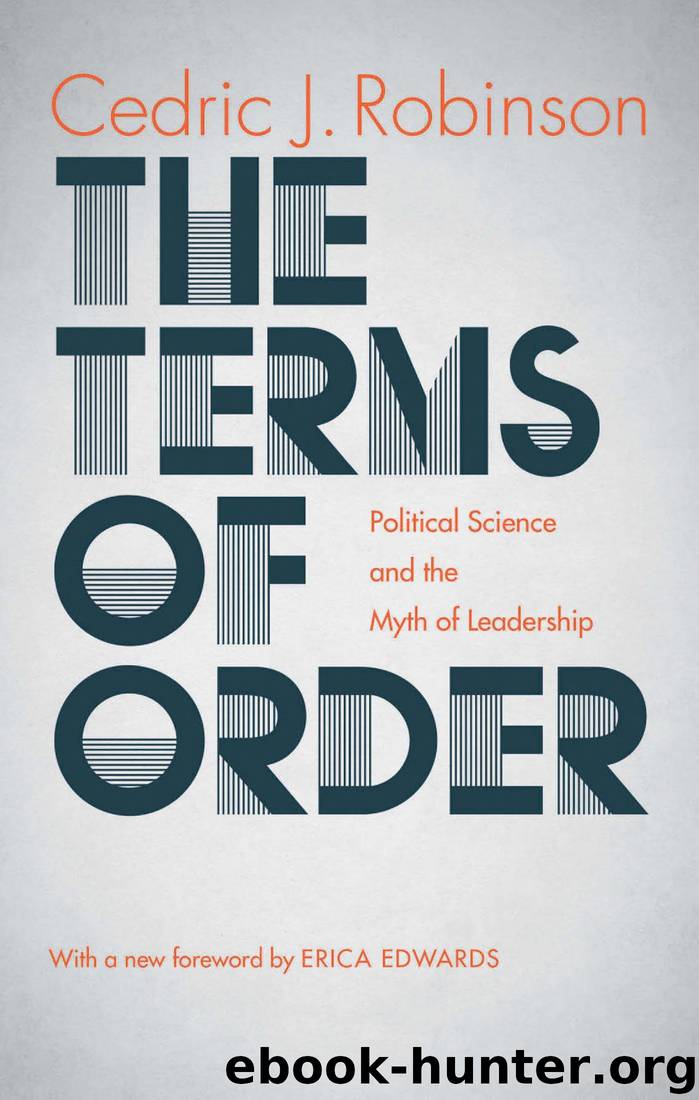The Terms of Order: Political Science and the Myth of Leadership by Erica Edwards Cedric J. Robinson

Author:Erica Edwards Cedric J. Robinson [Cedric J. Robinson, Erica Edwards]
Language: eng
Format: mobi
Tags: Social Science, Political Process, African American Studies, General, Political Science, Ethnic Studies
ISBN: 9781469628226
Publisher: UNC Press Books
Published: 2016-03-08T21:00:00+00:00
The Mythology of Political Thought
Myth, we have been recently advised by Godelier, proceeds by determining reality by analogy. Analogical thought, that is a form or a structure of thought, has its own impact on the content of thought, transforming and totalizing thought. Thought, through analogical patterning, becomes synthetic and analytical.
The contemporary paradigm of political society proceeds by analogy. The paradigm itself presupposes the actuality of the polis represented in the thought of Socrates and the writing of Plato, and through that presupposition reifies. And it is this reification on which political order rests—by analogy. However, it is not just one analogy but two inequivalent and complex analogies.
The first analogy—to physis (Nature)—resides in the midst of the controversy which arose in Greek thought during the Sophistic movement: the controversy between nomos and physis. Dodds argues that this movement was the conjunction of the “Inherited Conglomerate” (Gilbert Murray’s term) of the Archaic Age whose end was marked approximately by Aeschylus,68 and the Greek Enlightenment; “its roots are in sixth-century Ionia; it is at work in Hecataeus, Xenophanes, and Heraclitus, and in a later generation is carried further by speculative scientists like Anaxagoras and Democritus.”69 That is, it was a conjunction between a cultural history and a rationalism which resulted in “the revival of incubation, the taste for orgiastic religion, the prevalence of magical attack.”70 With this transgression against tradition, and as an expression of it, arose the question of on what basis did human society rest upon: on tradition (and if so, on which aspects of what had become a complex and contradictory tradition), or on human nature (the physis which Dodds describes as “human psychology”)?
In addressing themselves to this dispute, the rationalists sought their answer in the critical investigation of Virtue (arete), an investigation which for many of them would end in trials for heresy.71 Specifically, for Socrates, arete was identified with episteme, as Dodds puts it:
For to Socrates arete was something which proceeded from within outward; it was not a set of behavior-patterns to be acquired through habituation, but a consistent attitude of mind springing from a steady insight into the nature and meaning of human life. In its self-consistency it resembled a science.72
Bruno Snell makes the same point:
The model which Socrates required for his teleological knowledge had to come from another quarter. He found it—another innovation—in the craftsmen. As a carpenter must know a good table before he is able to construct it, so must a man know in advance what is good before he can act properly. Anyone who possesses a mechanical knowledge of some sort will also, as a matter of course, turn out something good.
And further:
The direction of Socrates’ thinking is, for that reason, given with his language from the first. The nature of his vocabulary enforces a close relation between knowledge and practical interest, between knowledge and ethical thought; and this is in fact the special achievement of Socrates in the history of Greek philosophy.73
Thus in the sixth and fifth centuries, while not distinguishing between
Download
This site does not store any files on its server. We only index and link to content provided by other sites. Please contact the content providers to delete copyright contents if any and email us, we'll remove relevant links or contents immediately.
The Secret History by Donna Tartt(16621)
The Social Justice Warrior Handbook by Lisa De Pasquale(11489)
Thirteen Reasons Why by Jay Asher(7788)
This Is How You Lose Her by Junot Diaz(5769)
Weapons of Math Destruction by Cathy O'Neil(5036)
Zero to One by Peter Thiel(4824)
The Myth of the Strong Leader by Archie Brown(4789)
Promise Me, Dad by Joe Biden(4447)
Beartown by Fredrik Backman(4415)
Stone's Rules by Roger Stone(4415)
How Democracies Die by Steven Levitsky & Daniel Ziblatt(4398)
The Fire Next Time by James Baldwin(4342)
100 Deadly Skills by Clint Emerson(4076)
A Higher Loyalty: Truth, Lies, and Leadership by James Comey(4032)
Rise and Kill First by Ronen Bergman(4012)
The David Icke Guide to the Global Conspiracy (and how to end it) by David Icke(3881)
The Farm by Tom Rob Smith(3872)
Secrecy World by Jake Bernstein(3782)
The Doomsday Machine by Daniel Ellsberg(3730)
